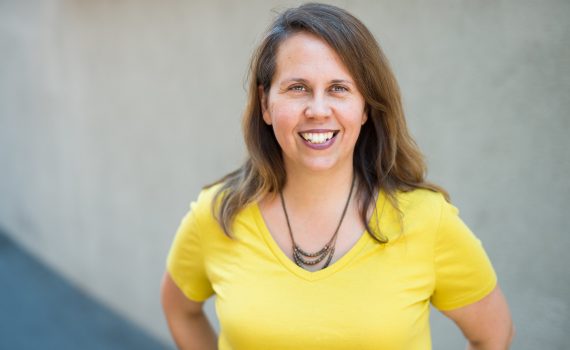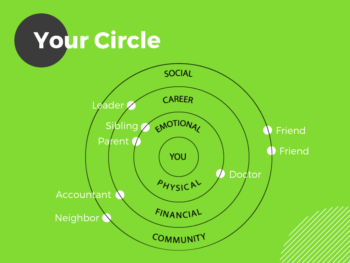
Episode 019: Melanie Seibert: Applying Insights from Personality Inventories
Category:introversion,Introverted Leadership,introverts,Leadership,personality,PodcastPodcast: Play in new window | Download
Subscribe: Spotify | Amazon Music | iHeartRadio | Podchaser | TuneIn | Deezer | RSS
Episode 019 Show Notes: Melanie Seibert
Introduction

Key concepts
- StrengthsFinder and other inventories
- You don’t always get what you want to
- The lingering impact of limiting statements
Quotable
You don’t have to be a certain personality type to be a leader. You can be an introvert. You can be creative. You can be analytical, whatever. @melanie_seibert
I knew in my mind the qualities that I wanted to have and it was an adjustment to accept the strengths that I actually do have and see how I can use those, instead of trying to be someone I’m not. @melanie_seibert
Statements made about you early in your life (such as you won’t be creative) can have a big impact on what you believe about yourself. Depending on how you take them, can probably limit yourself quite a bit. @benwoelk
How important it is to have a team where people are complementary, so that those strengths are there, but also where there are weaknesses those are bolstered and really shored up by having the right people on the team. @benwoelk
As an INFJ, I’m just really fascinated with people’s stories, and how people work on the inside. @melanie_seibert
Personality inventories give us permission to do things that we thought we weren’t suited for, and I feel like that sense of having permission is helpful to some people. I just want to encourage people to not doubt that they can be leaders. @melanie_seibert
Resources or Products Mentioned in this Episode
- Prose Kiln
- StrengthsFinder
- Keirsey Temperament Sorter
- DISC
Links
- Follow Hope for the Introvert on Twitter
- Like my page on Facebook
- Support me on Patreon
- Get swag for Hope for the Introvert and Introverted Leadership at Zazzle
Transcript
Ben: So welcome back Melanie. I’m looking forward to more conversation. It’s been fascinating so far.
Ben: What do you think your biggest strengths are? And we started to talk a little bit about the StrengthsFinder, and I have actually not taken that one yet. I’ve done the Enneagram (which I can’t remember any of the detail on) and DISC, which I’m really not super fond of. And of course the Myers-Briggs/Keirsey type things. I have not yet done the StrengthsFinder thing. Tell me a little bit about that test. I guess what would be really interesting, I think, would be if you have any idea what you felt like your strengths were before you took the test, and whether you learned something from that test that surprised you.
Melanie: Yeah. So the StrengthsFinder is really interesting because the way–I learned about it when I went to work at Rackspace, and they as an organization have every person who’s hired take the StrengthsFinder before you start, and then when you start you get your results. And there are sort of orientation meetings to talk about what it means and how to work with different people. So they told us that when the researchers who created StrengthsFinder ultimately first set out, they wanted to find, was what are the traits of leaders. What are all the common personality traits that leaders have, and they expected to find when they interviewed executives and managers and those type of people–they expected to find common traits across everyone. And what they actually found was these 34 different strengths that were in different combinations for every leader. So it was surprising to them.
Melanie: But, the takeaway from that is that you don’t have to be a certain personality type to be a leader. You can be an introvert. You can be creative. You can be analytical, whatever. And so it’s funny that you say what was I expecting, because I was in this mode where I was like–I’m going to be a content strategist now. I’m going from being a writer, which is sort of a more creative role, to being strategic and analytical and thinking more big picture. And so I was really hoping to get a–there’s a strength called strategic. There’s a strength called communication. And there’s–there are a few others that look–there’s one called self assurance that I really wanted, but I just knew that wasn’t gonna happen. So, when I finally got my results, communication, strategic, self-assurance were way down towards the bottom, and at the top I had connectedness, input, positivity, relater. I can’t remember all of them right offhand, but I had adaptability, and I was just like, “Oh man!” All these–they sounded very sort of unappealing and wishy-washy to me at the time. But over time, I’ve really learned to value and I’ll see myself doing things and if I do a certain thing, well I’m like, “That’s because I have connectedness.” Like I’m always connecting people with resources, or I just find that super satisfying to–I don’t know–help people learn about something, and I’ll tell them, “Oh, there’s this great book that I read or whatever.”
[bctt tweet=”You don’t have to be a certain personality type to be a leader. You can be an introvert. You can be creative. You can be analytical, whatever. @melanie_seibert” username=”hopeintrovert”]
Melanie: And there’s value to that. So, I think positivity is probably the only strength that I have that is actually–at the time they counted it as a leadership type of strength. It lets you influence people and it lets you influence people’s behavior. There are others that I definitely don’t have as much of. One is command, which is where you’re just like totally comfortable being the boss, and one is woo, which they say it stands for winning others over, which means you’re kind of like the salesman. You’re like everyone’s best friend. You meet a person and you’re like their best friend within two minutes, and you’re all buddy buddy with them, and then when you meet someone else you’re sort of their best friend. So it’s like, I don’t know, it’s very charming. Sounds like an extrovert thing. I don’t know, I can talk about it all day.
Ben: It sounds like a courtship-type thing. When you said the wooing part, I mean that’s the context, but it sounds appropriate for what you’re talking about as well. It’s funny to me that when you took the inventory that you were hoping to have strengths in certain areas.
Melanie: Yeah, I mean I don’t think I knew the words for them, or what the outputs would be, but I knew in my mind the qualities that I wanted to have, like how I wanted to see myself, and it was an adjustment to accepting the strengths that I actually do have and seeing how I can actually use those, instead of trying to be someone I’m not. Basically, like I’m never going to be–the boss had self assurance and I was so jealous because I want to be able to just walk into a meeting and lead the meeting and feel totally comfortable doing that, and just assume that people are going to accept my ideas, ’cause I have the best ideas, and that type of thing. I’m just never going to be comfortable doing that. I’m always going to be a little bit more reserved, a little bit more like tentative. Like I think this is the best course of action, but I’m always open to feedback, or if other people have other ideas, let’s hear ’em. That type of thing. So it was definitely a process.
[bctt tweet=”I knew in my mind the qualities that I wanted to have and it was an adjustment to accept the strengths that I actually do have and see how I can use those, instead of trying to be someone I’m not. @melanie_seibert” username=”hopeintrovert”]
Ben: Yeah. It sounds like it was a very–very much a self discovery thing. With some of it too, and some of it just does seem to be putting the words around what those strengths were. It’s funny because when I took the Keirsey.com Temperament Inventory, I was really surprised at some of the results of it, and I talked to my wife about it and then said, “Well, this is funny. Did you know that it says I’m really, really willfully independent?” And so that, “Yes!” [Melanie laughing] So it’s like the things that were not a surprise to people who knew me, but they were certainly a surprise to me. And what I found most helpful with the inventory I took, and I think this is true for many of them, is that it does help you identify your strengths.
Ben: And for me it was even to the point of, “Oh, Keirsey says I’m an INTJ.” Keirsey says, “Oh, they can be good leaders. I must be able to be a good leader.” And that was actually my reaction to it, because I grew up with that Western ideal of what leaders must be like, and knowing I was not this charismatic individual who was going to stand in front of everyone, or be commanding or anything else. It was just really wild to me to discover that, I could actually be a good leader. I learned things, like I’m innovative–creative and that should be an obvious thing, but I still go back to conversations in elementary school that I remember my parents having with my teachers, where they basically said, “Well, he’ll be able to learn anything at all, but he’s–he’s not going to be creative.” And that kind of thing–as surface as it seems like it should be–that really stuck with me. And I was really surprised that “Oh my goodness, I can be creative. I can be innovative.” And I embrace that now. But I did–It was like I didn’t even know it was a possibility. So it’s kind of funny, because for me it’s kind of how these, not really random comments, but how these statements early on in your life can have a big impact on what you believe about yourself. And probably, depending on how you take them can probably limit yourself quite a bit.
[bctt tweet=”Statements made about you early in your life (such as you won’t be creative) can have a big impact on what you believe about yourself. Depending on how you take them, can probably limit yourself quite a bit. @benwoelk @introvert_leadr” username=”hopeintrovert”]
Melanie: Yeah. Isn’t that funny? It’s almost like it’s liberating because someone’s giving you permission, you know, saying, “Yes, it’s okay. You can be creative.” You know, it’s–it’s really amazing how we internalize those impressions. I think I had a similar impression of myself. I don’t remember anyone ever telling me you can’t be creative, but I definitely–I–oh man, this is embarrassing! I walked into a job interview for a copywriting job when I was in my early twenties and the hiring manager said, “Well, are you creative?” And I said, “No,” [laughing] because I really don’t think of myself as creative. But later I was just like, well, first of all that was really dumb thing to say in a job interview. You don’t ever say that. But secondly, it’s not true because I’ve seen where I can be creative in ways that maybe I didn’t realize. So yeah, I definitely had a similar experience
Ben: It’s funny, and I imagine talking to a lot of people, we’d find out that there were little things that people said, and they took them to heart, or that these things have had an impact on them. So I think it’s great. I think all of these inventories are really useful. Some of them I personally like more than others, but in general I think they’re useful because I think that whole self discovery piece is really important. It’s so–I mean for me–I mean I haven’t, like I said, I have not done StrengthFinder yet, but it’s going to come back with strategic. Everything else that I’ve looked at talks about being strategic, and that helps me in terms of understanding what I’m good at and what I’m not good at. I’m in the process of planning a party (and this will release after this party occurs), but it’s a surprise party, and their are logistics, and I am going crazy because I don’t like dealing with the logistics. That level of detail as opposed to the overall strategy thing, I’m just finding to be a really, really big challenge. So it also, I think, points to how important it is to have a team where people are complementary, so that those strengths are there, but also where there are weaknesses (and we all have them), where those are bolstered and really shored up by having the right people on the team.
[bctt tweet=”How important it is to have a team where people are complementary, so that those strengths are there, but also where there are weaknesses those are bolstered and really shored up by having the right people on the team. @benwoelk” username=”hopeintrovert”]
Melanie: Yeah, absolutely. And I think that was one reason why Rackspace really invested in that methodology, and also understanding your own strengths and understanding that someone else is not going to see the problem the same way you are, and there is a place for both people on the team. We really need each other. And in fact, their whole philosophy was, “If you’re not good at something, then let somebody who is naturally good at it do it, and you develop your strengths, not your weaknesses,” which is kind of a whole other kind of interesting take. But their point was you’re going to go farther building on your strengths, then you will be than you will trying to mitigate your weaknesses. So, work together. And so, it’s really interesting.
[bctt tweet=”If you’re not good at something, then let somebody who is naturally good at it do it, and you develop your strengths, not your weaknesses. @melanie_seibert” username=”hopeintrovert”]
Ben: I think that makes sense. I can see the downside of that. I mean, I think if it’s a case where your weaknesses are, I’m going to say, non-strengths, your weaknesses are impeding your ability to do something, then you obviously need to work on them. But in theory it makes perfect sense, because if you want to basically get the best part of each person and their best viewpoints involved, it seems like the product would naturally be stronger because you are leveraging everyone’s strengths. I can see the wisdom in that. It’s an interesting discussion.
Ben: You had mentioned that in a previous job that the leadership thing didn’t really pan out, because they were looking for a specific type of leader, more of a command-and-control type situation. And I know when–I don’t like being on either side of that. I cannot stand being micromanaged, and I probably, if anything, don’t necessarily provide as much management input with people who are doing things for me as I need to, because I’m very much, “Well I’m happy with whatever way you do it and I expect you to use your strengths, whatever you’re doing.” But I can see how that’s been a bit of a bit of a challenge at times as well.
Ben: We started to talk a little bit about what it’s like being an introvert in the workplace, and maybe not in a–well you are in a senior content strategist role. So it is a leader role in a way, or very much a leader role. How about in general in life, do you find that being an introvert impacts how you act in other situations or social situations?
Melanie: Yeah. So it’s really interesting that you sent me the link to the Keirsey Personality Inventory. I’m not sure if I’m calling it the right thing, but my profile there is the Counselor. So I’m the person who, it doesn’t matter if it’s at work or at church or at home, people are always coming to me with their problems. I had someone–a relative–texting me last night with what was a parenting question, and I think, I’m not sure why that is, but it has something to do with I’m really comfortable listening to people, and I’m very nosy, so I want to know everyone’s business, and I want to know all about their problems, and I really want to know what they’re really thinking, like what is really going on with this person under the surface. And for some reason, I’m just fascinated. So it’s not an altruistic thing necessarily. It’s kind of a selfish thing. I’m just really fascinated with people’s stories, and how people work on the inside. So yeah, that definitely does come out in my sort of daily life. Like, people will open up and tell me things, and it turns out that if you listen to people, you’ll be surprised at the things that they will tell you. I’m always sort of asking for information and expecting people to say, “Well, no, I don’t want to talk about that.” Or, “That’s too personal,” and it is really unusual for a person to say that. People will tell you a lot. I think a lot of people just really want to be listened to. I do find that.
[bctt tweet=”As an INFJ, I’m just really fascinated with people’s stories, and how people work on the inside. @melanie_seibert” username=”hopeintrovert”]
Ben: Especially if they think they can trust you. And that you will give them good input, but–and obviously not take the information and use it for whatever purposes. It’s funny because I look at our initial guest list on the podcast, and you are the fourth or fifth INFJ that I’ve had on the podcast, and in some ways it makes sense, but if you look at the Keirsey Temperament Sorter or the Myers Briggs, and the statistics around it, INFJ is the most rare temperament type.
Melanie: Really!
Ben: So I just find it really intriguing that I have so many friends who are INFJs.
Melanie: I’m curious to know which temperament types are the most common, so I’m going to have to do some Googling after this.
Ben: I don’t have the numbers handy, but one of the big differences that Keirsey talks about is that you have your Ns who are the intuitives and you have your Ss who are more concrete. There are far more concrete thinkers in our world than there are people who are intuitive, like INTJ or INFJ or anything like that. And I think from what I’ve been able to tell, the Ss are more much more practically focused, which is probably a good thing, because I know I can be very abstract and thinking about possibilities and things like that. So I think the Ss are pretty much holding us together. While some of us are very speculative and want to come up and try all these new ideas and things. And the INFJ as a guest doesn’t totally surprise me, because we’re all very interested in this whole temperament thing now and how it impacts things. And I think we tend to be naturally more introspective, not even just as introverts, but especially with being intuitive instead.
Melanie: That makes a lot of sense. And also if you’re talking to people in sort of technology-related fields, I feel like that N orientation where you’re thinking about possibilities and trying to innovate, that is definitely encouraged more in tech and in the type of world where we work, so that also might have something to do with it. That is really interesting.
Ben: I’d like to talk a little bit about recommendations you might have for introverts who want to become influencers or leaders. What recommendations would you have?
Melanie: Yeah, I guess my main recommendation is to, as we discussed earlier, we talked about how the personality inventories gave us permission to do things that we sort of thought we weren’t suited for, and I feel like that sense of having permission is helpful to some people, and so I just want to encourage people to not doubt that they can be leaders. I’m reading a book right now. It’s about systems thinking, and it’s very much about learning and leading, and the author is very against this idea that only executives are leaders or only managers are leaders. And I definitely had thought of it that way. You know, I think of the organization, you have your org chart and there are the people at the top of the org chart and those are the leaders.
[bctt tweet=”Personality inventories give us permission to do things that we thought we weren’t suited for, and I feel like that sense of having permission is helpful to some people. I just want to encourage people to not doubt that they can be leaders. @melanie_seibert” username=”hopeintrovert”]
Melanie: But in reality a lot of the change in organizations comes from the individual contributors or the people who have a lot of credibility amongst their coworkers, and they become leaders that way, even if they don’t have formal or structural power to command people to do things a different way, it’s much more effective. Change is much more effective when it comes from sort of that level, that individual level. And so in that sense we’re all leaders, if we’re engaged and we’re motivated at work, we can be leaders at work. And there are a lot of different ways to be a leader. So if you’re working in a setting where your leadership style really isn’t valued, that doesn’t mean that you’re not a leader or that you can’t be a leader. You might just not be in the right place, that you might not be in a place that really values the contributions that you have to give. Because that’s where I found myself, and I had to find a place where I could contribute something that the organization would value. So I guess that’s my main recommendation. It’s not very sort of technical, but I feel like it is important to some people.
[bctt tweet=”A lot of the change in organizations comes from the individual contributors who have credibility amongst their coworkers. They become leaders that way, even if they don’t have formal or structural power. @melanie_seibert” username=”hopeintrovert”]
[bctt tweet=”If you’re working in a setting where your leadership style really isn’t valued, that doesn’t mean that you’re not a leader or that you can’t be a leader. You might just not be in the right place. @melanie_seibert” username=”hopeintrovert”]
Ben: I appreciate your time and thanks for a great interview!
Melanie: Thanks, Ben! It’s been great chatting with you.

















